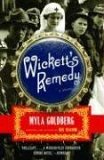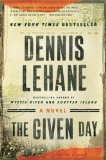Summary | Excerpt | Reading Guide | Reviews | Beyond the book | Read-Alikes | Genres & Themes | Author Bio

A Novel
by Myla GoldbergThrough narrative, authentic newspaper clippings, and fictional correspondence, the author of Bee Season offers an intimate view of the life of Lydia Kilkenny, a shop clerk and daughter of Irish immigrants in South Boston in the early 20th century.'
In a
multidimensional, intricately wrought narrative, Myla Goldberg leads us
back to Boston in the early part of the twentieth century and into two
completely captivating worlds. One is that of Lydia, an Irish American
shopgirl with bigger aspirations than your average young woman from
South Boston. She seems to be well on her way to the life she has
dreamed of when she marries Henry Wickett, a shy medical student and the
scion of a Boston Brahmin family. However, soon after their wedding,
Henry abruptly quits medical school to create a mail-order patent
medicine called Wickett's Remedy, and just as Lydia begins to adjust
to her husband's new vocation, the infamous Spanish influenza epidemic
of 1918 begins its deadly sweep across the world, irrevocably changing
their lives.
In a world turned almost unrecognizable by swift and sudden tragedy,
Lydia finds herself working as a nurse in an experimental ward dedicated
to understanding the raging epidemic—through the use of human
subjects.
Meanwhile, a parallel narrative explores the world of QD Soda, the
illegitimate offspring of Wickett's Remedy, stolen away by Henry
Wickett's one-time business partner Quentin Driscoll, who goes about
transforming it into a soft drink empire.
Throughout the novel we hear from a chorus of other voices who offer a
running commentary from the book's margins, playing off the ongoing
narrative and cleverly illuminating the slippery interplay of perception
and memory. Based on years of research and evoking actual events, Wickett's
Remedy perfectly captures the texture of the times and brings a
colorful cast of characters vividly to life—none more so than Lydia, a
heroine as winning and appealing as Eliza, the beloved spelling champion
of Bee Season.
With dazzling dexterity, Goldberg has fashioned a novel that beautifully
combines the intimate and the epic. Wickett's Remedy announces
her arrival as a major novelist.
Myla Goldberg is the author of the bestselling Bee
Season; an essay collection, Time’s Magpie, which explores all
her favorite places in Prague, where she lived for a year in the early nineties;
and Wickett’s Remedy which grew out of her fascination with the 1918
influenza epidemic. She lives in Brooklyn with her husband, cartoonist Jason
Little, and their daughter.
Did you
know?

If you liked Wickett's Remedy, try these:

by Mary Beth Keane
Published 2014
A bold, mesmerizing novel about the woman known as "Typhoid Mary," the first known healthy carrier of typhoid fever in the burgeoning metropolis of early twentieth century New York.

by Dennis Lehane
Published 2009
Set in Boston at the end of the First World War, New York Times bestselling author Dennis Lehane's long-awaited eighth novel unflinchingly captures the political and social unrest of a nation caught at the crossroads between past and future.